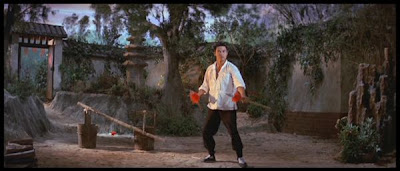His father unfortunately dies after his birth and his mother's appeal to return to the fold was rejected by the family. His hopeful loving mother dreams that someday that her only son might inherit the title but dies sooner than expected. The family declined his mother's last wish to be buried in the family crypt which proved to be the last straw, his only solution now is to take the title by force through the murder of all the remaining D'Ascoyne's.
Price was able to portray a mild mannered sophisticated man able to mask the hidden monster inside himself, this is the reason why no one was able to suspect the rather unusual escalating deaths of the D'Ascoyne clan. His uncle Lord Ascoyne D'Ascoyne (Alec Guinness) takes pity and gives him a job at the family bank, this triggers his plans and sets in motion the murder of the D'Ascoyne's which will give him the title in succession. I'm sure if this film was made today it would have been more macabre and disturbing, but the big difference of the "Ealing Comedies" from all others is the class and humor they inject in the plot and the characters.
It was Dennis Price who may have gotten the top billing but it was obviously the Alec Guinness show. His portrayal of the 9 characters including the female member of the family in Lady Agatha D'Ascoyne was nothing short of brilliant. The difference between Peter Sellers, Eddie Murphy and others who have done similar roles of portraying different characters on one film was they were all asking for laughs while Guinness did not. Yes this was a black comedy but Guinness was portraying real characters that the director Robert Hamer was trying to introduce to the audience. The Guinness impersonations were so good I actually learned to hate and sympathize with each of the D'Ascoynes that Mazzini methodically murdered because he was a nobody and everybody at the same time. I loved it when he pushed the Young Ascoyne D'Ascoyne's boat over a weir but I also hoped that he would have changed his mind in murdering nice guy Henry D'Ascoyne.
The great thing about the film was it showed the story through the eyes of the monster Mazzini, yes we sympathized with him but he was still the murderer we were rooting for blurring the difference between good and evil. It was also ironic that in the later part of the film that Mazzini would be convicted of murdering his rival, someone he did not actually kill because his woman Sibella (Joan Greenwood) hid the suicide note meant to show his innocence. **SPOILER ALERT**The twist of fortune and fate is cruel and sometimes humorous as he was suddenly proclaimed innocent when the note was "found", now he was free to live the life he dreamed of and love his cousin's widow Edith (Valerie Hobson) but he mistakenly leaves the confession he wrote in his prison cell.
You forgot your confession pal.
To sum up this is probably one of the best Ealing Comedies ever made and without the aide of special effects Alec Guinness' performance in this film became legendary. This was also cleverly written and told through the eyes of the would be protagonist, the man who tried to avenge his mother and himself but instead became a monster. It's safe to say that what this film is trying to say to the audience, you really can't choose your family because fate chooses and kills them for you.
Grade: A+





















































